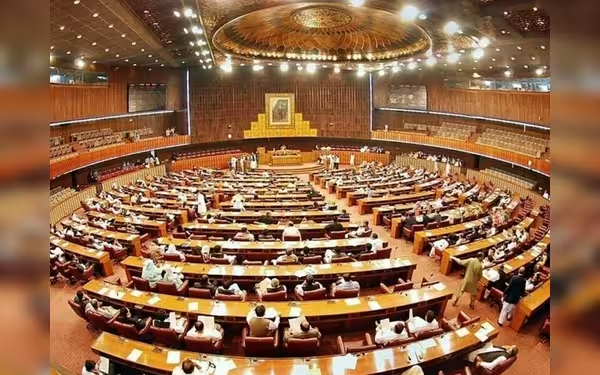Saturday, November 16, 2024 07:55 PM
Political Delays in Pakistan Over Amendment Package Negotiations
- NA and Senate sessions face significant delays.
- Government seeks two-thirds majority for amendments.
- JUI-F raises concerns over lack of transparency.
 Image Credits: brecorder
Image Credits: brecorderDelays in Pakistan's NA and Senate sessions as political meetings continue over a crucial amendment package, raising transparency concerns.
The political landscape in Pakistan is currently abuzz with activity as the National Assembly (NA) and Senate sessions face significant delays. These delays come in the wake of ongoing political meetings aimed at finalizing a crucial ‘amendment package’ proposed by the government. This package, which includes a controversial proposal to increase the retirement age of judges in superior courts, has sparked intense debate and opposition, particularly from the Pakistan Tehreek-e-Insaf (PTI) party.
On Sunday, the NA session was adjourned shortly after it began, with plans to reconvene the following day at 12:30 PM. The initial schedule for the session was set for 11:30 AM but was later pushed to 4 PM at the request of a Special Parliamentary Committee. However, even this revised time could not be honored due to ongoing discussions between government officials and various political factions. The Senate session also faced similar delays, ultimately being rescheduled for 10 PM.
For the government to successfully pass the proposed constitutional amendment, it requires a two-thirds majority in both the NA and the Senate. Specifically, the ruling coalition needs 224 votes in the NA and 64 in the Senate. Currently, the treasury benches in the NA comprise 211 members, while the opposition holds 101 seats, indicating that the government is short by 13 votes to secure the necessary majority.
In a bid to garner support, government representatives, along with PTI delegations, met with Jamiat Ulema-e-Islam (JUI-F) chief Maulana Fazlur Rehman, who has emerged as a key figure in these negotiations. Following these discussions, JUI-F General Secretary Maulana Abdul Ghafoor Haideri expressed concerns regarding the lack of transparency, stating, "We still have not received the draft bill. When we can’t read it, how can we vote for it?" This statement directly contradicted earlier claims made by the Minister for Information and Broadcasting, Attaullah Tarar, who asserted that the draft had been shared with Maulana Fazlur Rehman.
In an effort to solidify support for the amendment package, Prime Minister Shehbaz Sharif hosted a dinner for lawmakers from the ruling alliance on Saturday. During this gathering, he sought to reassure them of the importance of the proposed changes and emphasized the need for their presence in Islamabad for the upcoming sessions.
The ongoing political maneuvering highlights the complexities of governance in Pakistan, where coalition dynamics play a critical role in legislative processes. As the government strives to push through this amendment package, the outcome remains uncertain, with various parties weighing their options and strategies. The situation serves as a reminder of the intricate balance of power within the country’s political framework, where every vote counts and the stakes are high.
The delays in the NA and Senate sessions reflect not only the contentious nature of the proposed amendments but also the broader challenges facing Pakistan's political system. As lawmakers navigate these turbulent waters, the importance of transparency and collaboration cannot be overstated. The coming days will be crucial in determining whether the government can rally enough support to pass the amendment package, which could have lasting implications for the judiciary and governance in Pakistan.













